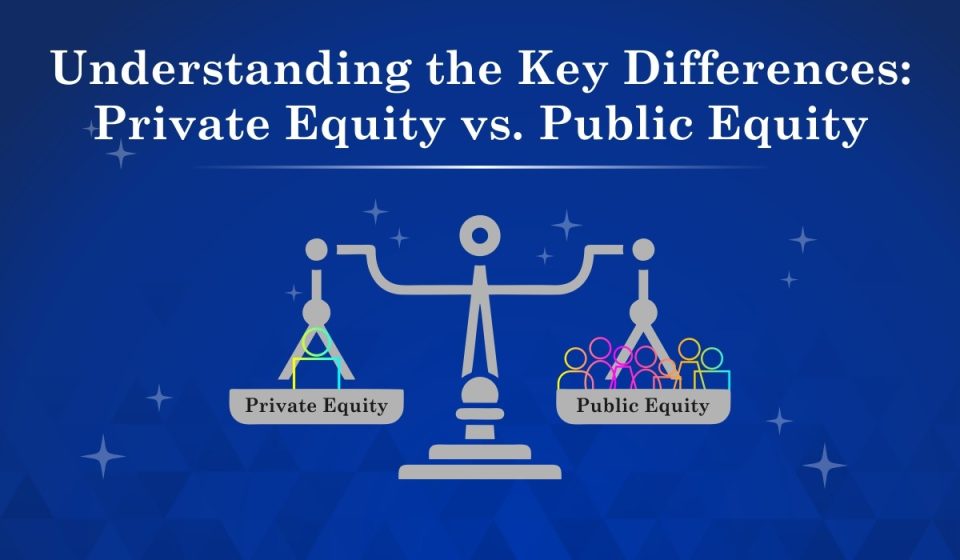Equity investments are shares of ownership in a company. There are two types of equity: public equity, which is ownership in a company that is publicly traded, and private equity, which is ownership in a company that is not publicly traded.
What is Equity?
Equity investments are like a key that opens the door to a company’s ownership. This key comes in the form of shares or stocks, which give you a claim on the company’s assets and earnings. As an equity investor, you’re not just a spectator but part of the action. You can benefit from the company’s success and growth, and even receive a share of its profits in the form of dividends.
When you have public equity, you own a share of a publicly traded company on a stock exchange. On the other hand, private equity involves owning a share of a privately held company and not available for trading on public markets.
What are Public Equity and Private Equity?
Private equity is an investment offering ownership in a private company with undisclosed financial information to the general public. It allows for speculation, long-term focus, and less regulation. It involves venture capital for start-ups and leverage buyouts for purchasing shares of target firms.
On the other hand, public equity allows investment in public companies, offering transparency, accountability, and regular financial disclosures for investor security. Public equity also involves holding annual meetings and trading in the securities market, allowing shares to be sold to the general public as liquid assets. However, public equity shares are not without risks during adverse political or economic situations.
Public equity is one of the main types of assets, along with bonds and cash. Private equity is considered an “alternative” type of asset, along with other types like private debt, real estate, infrastructure, and natural resources. Private equity has unique characteristics like its fund structure, stakeholder restrictions, liquidity, and risk factors.
Key Differences between Public Equity and Private Equity
| Serial No. | Basis of difference | Public Equity | Private Equity |
| 1) | Type of Investors | Public equity, which is equally accessible, occurs when a company, goes public for an initial public offering (IPO). When a company is listed on a stock exchange, it can raise capital from the public market, and anyone, regardless of their background, can invest. | Private Equity financing is not limited to a specific group. Investors can come from various sources such as family and friends, business angels, venture capital, crowdfunding, or accelerators. These are all examples of private equity. Private equity involves a diverse range of financiers like pension funds, insurance companies, or sovereign wealth funds investing in a private company. |
| 2) | Disclosure of Information about the Company | Public equity investors must disclose comprehensive financial information about their stocks to the general public. This financial transparency provides shareholders and the public with a clear understanding of the company’s financial health, performance, and outlook. This openness and disclosure foster a sense of reassurance and confidence in the integrity and operation of these public companies. | Private equity investors are not required to release financial information about their stocks to the general public, and unlike publicly traded companies, private equity firms are not obligated to disclose their economic performance, earnings, or other key financial data to the general public or regulatory authorities. |
| 3) | Regulations | The public equity sector is subject to more stringent regulatory requirements compared to other sectors. This is because companies in this sector are required to disclose detailed information about their investment policies to the government and the general public. These disclosures are aimed at providing transparency and accountability in the use of public funds and investor protection. | The private equity sector benefits from a less stringent regulatory framework than other investment sectors. This means private equity firms are not required to publicly disclose detailed information about their investment policies to the government or the general public. |
| 4) | Trading and Investing | When it comes to public equity, investors can buy and sell shares among themselves or to the public without requiring permission from the company’s founders. This freedom to trade allows for greater liquidity and flexibility in the public equity markets. | In the realm of private equity, investors can buy and sell assets among themselves or with the general public, but this can only be done after obtaining the consent of the company’s founder. |
| 5) | Flexibility to Buy and sell shares | When it comes to public equity, investors can buy and sell shares among themselves or to the public without requiring permission from the company’s founders. This freedom to trade allows for greater liquidity and flexibility in the public equity markets. | In the realm of private equity, investors can buy and sell assets among themselves or with the general public, but this can only be done after obtaining the consent of the company’s founder. |
| 6) | Stage of a company when it chooses to go public | Publicly owned companies are well-established enterprises that have grown and matured to a point where they are suitable for public investment. To gain approval for public ownership from regulatory authorities and initial public offering (IPO) underwriters, a company is typically expected to meet several criteria: The company has a strong track record of steady past revenue and earnings, with enough money to support its initial public offering and ongoing activities. It has long-term potential for growth, a capable management team, and reliable, independently verified financial statements. Additionally, it has low levels of borrowed capital. | Private companies must still meet the qualifications for going public, and they are mostly in the earlier stages of their growth. This means that private equity investment can target companies at various points along the growth spectrum, ranging from firms preparing for an initial public offering (IPO) to those that are in the very early stages of establishment. |
| 7) | Voting Rights for the Investors | Yes, shareholders in a Public limited company have the voting rights to appoint their Management and to participate in the important decisions of the company such as the appointment of directors, approving the issue of new securities, and initiating a new merger or acquisition. The voting rights of equity shareholders and preference shareholders should be in proportion to the paid-up capital of the respective shares, as per Section 47 of the Indian Companies Act, 2013. The maximum limit for the issue of shares with differential voting rights is 25% of the total issue share capital. | No, the investors in the private limited company usually don’t have such voting rights. But usually, they get the right to participate in making management decisions. |
Frequently Asked Questions (FAQs)
What are Private Equity Funds?
Private equity firms invest in companies with high growth potential or those facing financial challenges to help them grow. They invest in specific companies using money collected from investors and can gain a stake in the company’s management.
What are the different forms of Private Equity funds?
Private equity funds are divided into two primary categories: venture capital and buyout or leveraged buyout. Venture capital specifically involves providing seed funding to early-stage startups in exchange for a share in the company. Unlike buyout funds, venture capitalists usually do not require a majority share, which can appeal to founders seeking investment.
In a leveraged buyout (LBO), the buyer takes on significant debt to purchase a company. They use assets from the purchased company as collateral and plan to pay off the debt using future cash flow. This allows the buyer to control the company, set new goals, and restructure the management team.
Are you a stock market enthusiast? If so, you will want to take advantage of Unicorn Signals! This incredible app, which also has a web platform, is a game-changer for Indian stock market investors, offering over 100 powerful tools and trading signals to elevate your investment strategy.
Disclaimer: Investing in the Equity market in India is subject to risks, i.e. the market keeps on fluctuating. This article is purely for educational purpose. The views expressed and data provided here are by Equitypandit’s team. Kindly do not completely depend on the information provided as the risk appetite differs from individual to individual and there are various other factors in the market to determine the factors to invest in the market.







